The Ultimate Guide to Sheep Vaccination Schedule: Deworming Chart/Calendar is a comprehensive resource for shepherds and sheep owners. It provides valuable information on the importance of vaccination and deworming in maintaining the health and well-being of sheep.
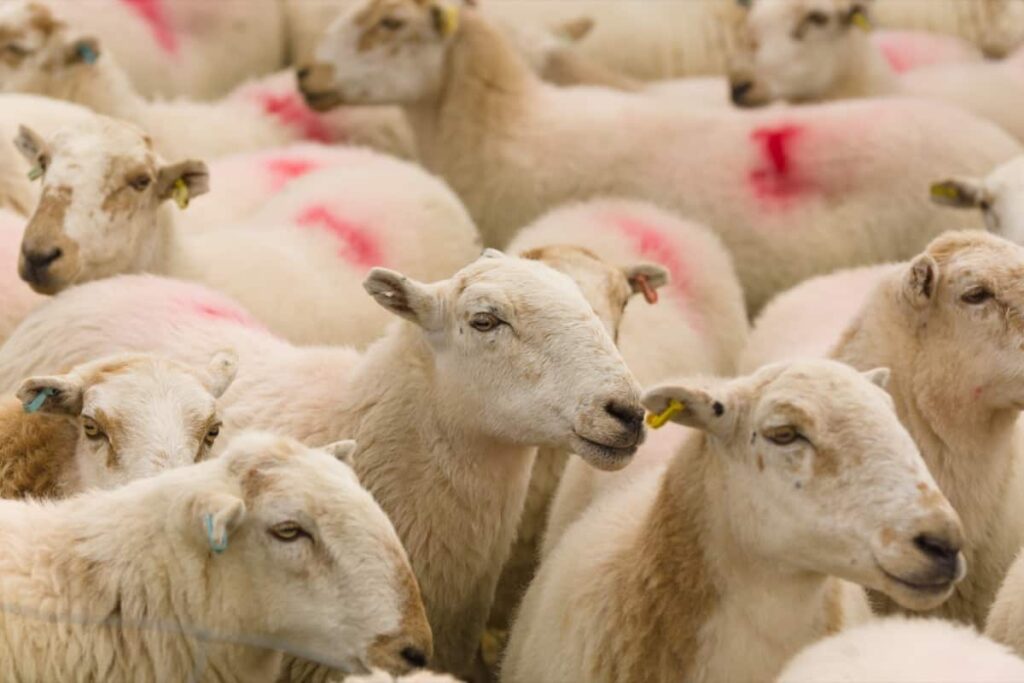
The guide covers various vaccines, their purposes, and the proper administration techniques. It also includes a user-friendly vaccination schedule and deworming calendar. Shepherds can protect their flocks from diseases and parasites by following this guide, ensuring their sheep remain healthy and thriving.
Basic Terminology Related to Sheep Vaccination Schedule
- Vaccination: The process of administering vaccines to sheep to stimulate their immune system and protect them from specific diseases.
- Deworming: The practice of treating sheep for internal parasites, such as worms, to maintain their health and prevent infestations.
- Vaccination Schedule: A predetermined plan that outlines when and which vaccines should be administered to sheep based on age, risk factors, and local disease prevalence.
- Deworming Calendar: A schedule that indicates when deworming treatments should be performed to control internal parasites effectively.
- Diseases: Sheep diseases can affect their health, productivity, and well-being. Vaccination helps prevent or reduce the impact of these diseases.
- Parasites: Organisms that live on or inside the sheep’s body and can cause harm or illness. Deworming treatments target these parasites.
Why Deworming Essential for Sheep?
As a livestock farmer, keeping your sheep healthy and disease-free is essential. Worm infestations are among sheep’s most common causes of ill health and death. Deworming your sheep is an essential aspect of sheep farming, and it helps keep your flock healthy and productive.
Significance and Benefits of Deworming and Sheep Vaccination
- Control of Worm Infestations: Deworming helps to manage and reduce the presence of internal parasites, such as worms, in sheep. This prevents the detrimental effects of heavy infestations on the animals’ health.
- Increased Productivity: By controlling worm burdens, deworming promotes improved feed utilization and nutrient absorption. This leads to enhanced growth rates, better weight gain, and increased productivity in sheep.
- Improved Animal Welfare: Worm infestations can cause discomfort, anemia, and other health issues in sheep. Deworming helps alleviate these conditions, improving the animals’ overall welfare and quality of life.
- Prevention of Disease Transmission: Many internal parasites can also act as disease vectors, spreading infections among the flock. Deworming reduces the risk of disease transmission, protecting the overall health of the sheep.
In case you missed it: Sheep Farm Operations Management: Month-Wise Maintenance For Better Profits
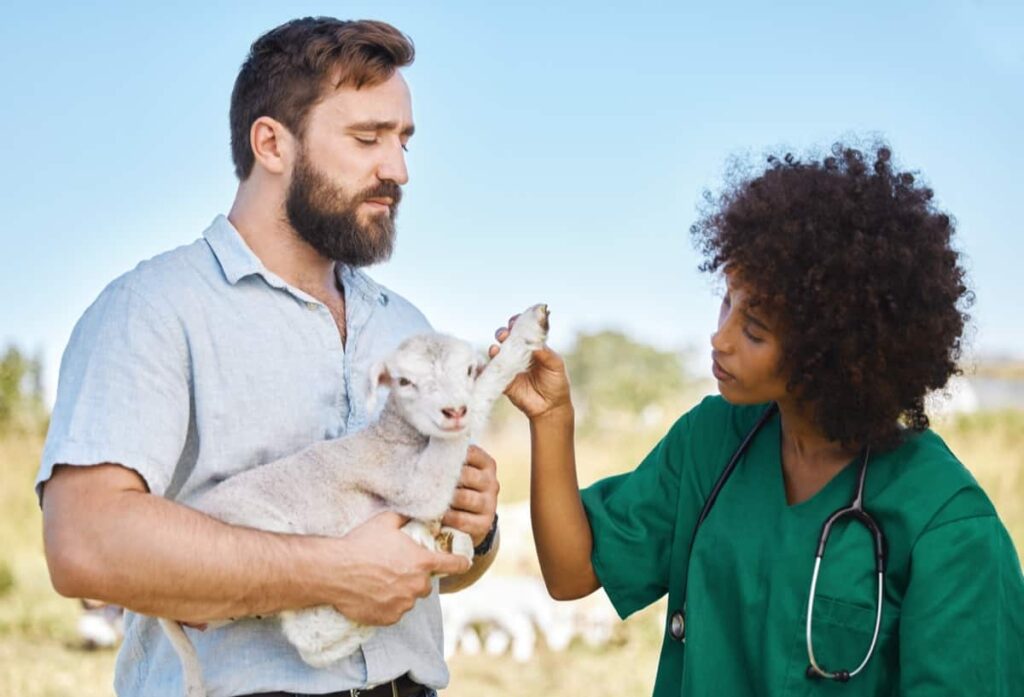
Different Types of Worms in Sheep
Different types of worms include the Barber pole, Brown stomach, and Lungworm. Each type of worm infestation presents distinct symptoms and requires specific treatment. The Barber pole worm (Haemonchus contortus) is a blood-sucking parasite that can cause anemia and weight loss in sheep. Brown stomach worms (Teladorsagia spp.) affect the abomasum, leading to diarrhea and reduced appetite. Lungworms (Dictyocaulus filaria) primarily impact the respiratory system, causing coughing and difficulty breathing.
Different Types of Deworming Schedules
- Proactive Deworming Schedule: Deworming sheep before worm infestations causes problems based on the type of worms prevalent in the environment.
- Reactive Deworming Schedule: Deworming sheep when worm infestations have already caused problems, considering the severity of the infestation.
- Type 1 Deworming Chart/calendar: Outlines the recommended timing for proactive deworming based on the type of worms in the area.
- Type 2 Deworming Chart/calendar: Depends on the severity of the worm infestation and emphasizes timely treatment.
- Vaccinations for Year 2 to Year 3: Different vaccines are required as sheep mature, and their immunity needs to be maintained.
- Annual Vaccinations: Sheep require annual booster shots for vaccines such as CDT, rabies, and pasture-related diseases.
- Booster sHots for Specific Vaccines: The vaccination chart/calendar provides guidance on the frequency of booster shots to sustain sheep immunity.
Note: Sheep can receive vaccinations during pregnancy, but certain vaccines should be avoided during specific stages of pregnancy. It is advisable to consult a veterinarian for guidance on administering vaccines to pregnant sheep.
Recommended Vaccine and Health Management Schedule for Sheep
Pregnant Sheep: Vaccinate 2-4 weeks before lambing or kidding with Clostridium perfringens types C and D and tetanus vaccines. Use cattle vaccines labeled safe for sheep. Also, use topical external parasite control (permethrin). Optional: Vaccinate for keds and lice in sheep.
New Lambs: At two weeks of age, dock tails and castrate. Administer 300 I.U. tetanus antitoxin if the dam was not vaccinated during gestation. Vaccinate 30 days after lambing or kidding with Clostridium perfringens types C and D antitoxin. Optional: Vaccinate for Enterotoxemia and Ovine ecthyma for sore mouth.
In case you missed it: How to Make Silage for Livestock: Business Plan, Preparation Process for Goats, Sheep, Pigs, and Cows
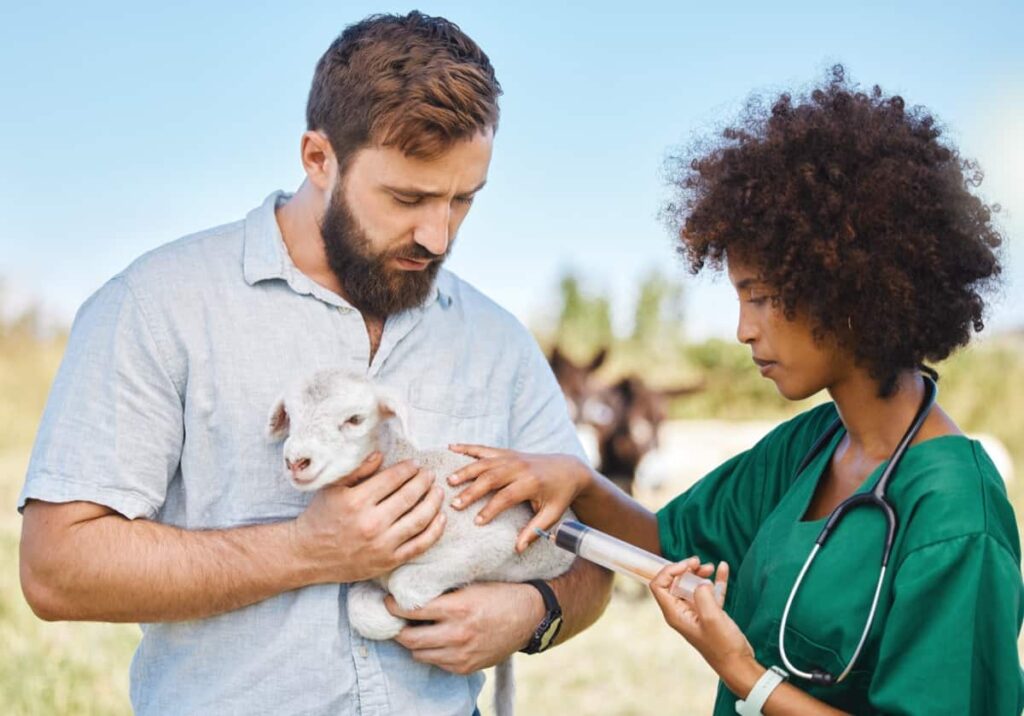
Bucks and Rams: 30-60 days pre-breeding, vaccinate with Clostridial 8-way vaccine. Administer anthelmintic (dewormer) selectively based on individual needs. Optional: Vaccinate for eight clostridial strain bacterial diseases.
Note: Read labels carefully before administering vaccines or treatments. Conduct a fecal egg count for optimal parasite control and to assess anthelmintic resistance. Consistency in deworming protocols is recommended. Use appropriate topical products for external parasites like keds and ticks. Additional doses may be needed depending on infestation levels. Take precautions during Clostridial vaccinations to minimize blemishes.
Sheep Health and Management Calendar for Vaccination
Pre-breeding – 45 Days
- Conduct a breeding soundness examination for rams.
- Shear, deworm and start feeding rams.
- Begin feeding ewes with 1/2-3/4 lb. of grain or graze high-quality pasture.
- Deworm the flock.
- Vaccinate ewes for abortion diseases (vibrio [campylobacter]/Enzootic abortion [chlamydia]).
- Identify ewes with paint brands and ear tags.
- Determine ram to ewe ratio.
- Introduce teaser rams two weeks before breeding.
Breeding – 60 Days
- Turn in the Rams.
- Use a marking harness to record breeding dates.
- Observe matings and rotate rams if needed.
- Check rams and ewes for internal parasites and deworming.
- Breed ewe lambs after all the older ewes are bred.
Pre-Lambing – 90 Days
- Conduct daily observation of the flock.
- Prepare lambing pens and clean the lambing area.
- Shear ewes or tag them in specific areas.
- Pregnancy test ewes.
- Start feeding ewes with 1/2-1 lb. of grain per 100 lb.
- Body weight six weeks before lambing.
- Vaccinate ewes for enterotoxemia and tetanus.
In case you missed it: 500 Sheep Farming Project Report and Bank Loan in India
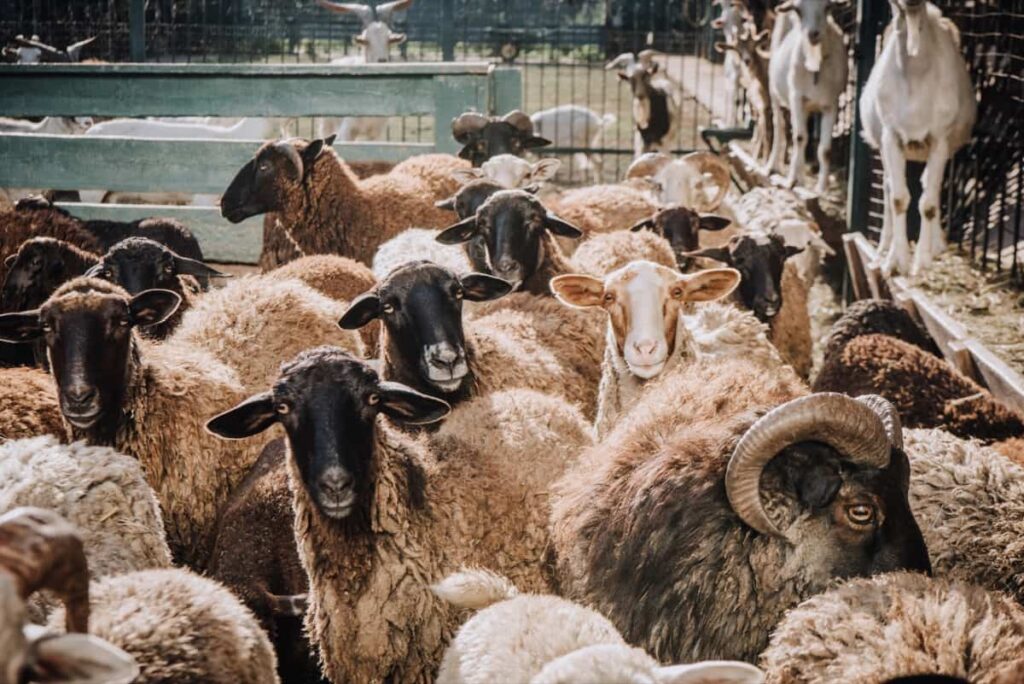
Lambing – 60 Days
- Be familiar with sheep obstetrics and be available to assist with lambing problems.
- Apply iodine to lambs’ navels and strip ewes’ teats.
- Ensure lambs nurse properly and keep ewes and lambs in the lambing pen for 1-3 days.
- Identify lambs and provide a creep ratio.
- Observe ewes and lambs daily.
- Deworm ewes, dock lambs, and castrate ram lambs.
- Separate ewes with singles from those with twins or triplets.
- Feed ewes 1-2 lbs. of grain daily and high-quality forage.
Pre-weaning/Lactation – 60-80 Days
- Vaccinate lambs for enterotoxemia.
- Continue feeding ewes with 1-2 lbs. of grain daily and high-quality forage.
- Remove grain from ewes’ ration.
- Wean lambs.
Post-weaning – 30-50 Days
- Sort and market cull ewes.
- Provide self-feed lambs with a complete growing and finishing ration.
- Market lambs at an average weight of 100-110 lbs.
- It’s important to note that these practices and timelines may vary based on specific management systems, geographical locations, and flock health conditions.
Best Practices and Tips for Sheep Vaccination and Deworming
Effective Sheep Vaccination
- Follow proper timing for vaccinations based on the specific vaccine and the age/development stage of the sheep.
- Identify the appropriate vaccines for your sheep, considering their needs and potential disease risks.
- Administer vaccines correctly, following proper dosage, route of administration, and storage guidelines.
In case you missed it: How to Make Sheep Manure Compost: A Step-by-Step Guide to Using in Your Garden
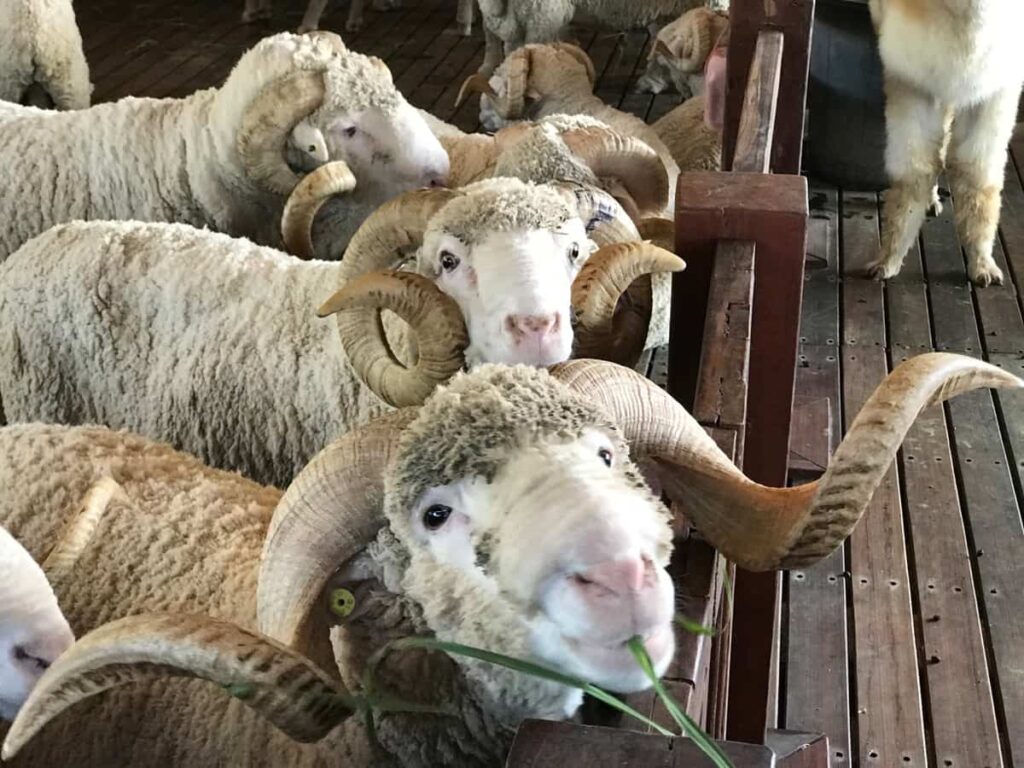
Effective Deworming
- Understand the type of worm infestation your sheep are prone to and select the appropriate dewormer.
- Follow the recommended deworming schedule, considering the worms’ life cycle and the sheep’s susceptibility.
- Administer the dewormer accurately, considering the dosage, route of administration, and any specific instructions.
- Maintain a clean environment for sheep, ensuring proper sanitation and regularly cleaning housing and bedding areas.
- Provide balanced nutrition through a diet appropriate for your sheep’s needs and stages.
- Practice regular hoof care to prevent hoof problems and maintain good mobility.
Sheep Vaccination Schedule for Lambs
- Lambs should receive their first vaccination at 6 to 8 weeks of age.
- Recommended vaccines for lambs include Clostridium perfringens types C and D, tetanus, and pneumonia vaccines.
- A second round of vaccinations is usually given at 10 to 12 weeks of age to ensure optimal protection.
- Other vaccines that may be considered for lambs include vaccines for enterotoxemia, sore mouth, and respiratory diseases.
Yearly Sheep Vaccination Protocol
- Yearly vaccinations are essential for maintaining the health of adult sheep.
- Common vaccines for adult sheep include Clostridium perfringens types C and D, tetanus, pneumonia, and rabies.
- Vaccination against diseases such as caseous lymphadenitis (CL), vibriosis, and chlamydia may be necessary depending on the region and the flock’s health status.
Sheep Immunization Timeline for Farmers
- The immunization timeline for sheep starts from lambhood and continues throughout their lives.
- Lambs should receive initial vaccinations at specific ages and boosters at appropriate intervals.
- Adult sheep require annual vaccinations to maintain immunity against common diseases.
- The timeline may vary based on geographic location, flock health history, and specific disease risks.
Routine Shots for Adult Sheep
Routine shots for adult sheep typically include vaccines against Clostridium perfringens types C and D, tetanus, pneumonia, and rabies. These vaccines help protect adult sheep from common diseases and maintain their health.
Recommended Vaccines for Sheep Flock
Commonly recommended vaccines include Clostridium perfringens types C and D, tetanus, pneumonia, rabies, and diseases specific to the region.
Vaccination Regimen for Pregnant Ewes
- Pregnant ewes should receive specific vaccines to protect themselves and their unborn lambs.
- Vaccines against Clostridium perfringens types C and D, tetanus, and other appropriate vaccines are recommended during pregnancy.
- Consultation with a veterinarian is essential to determine the safest and most effective vaccination regimen for pregnant ewes.
In case you missed it: Common Sheep Diseases, Symptoms, and Treatment: Check How this Guide Helps Sheep Farmers
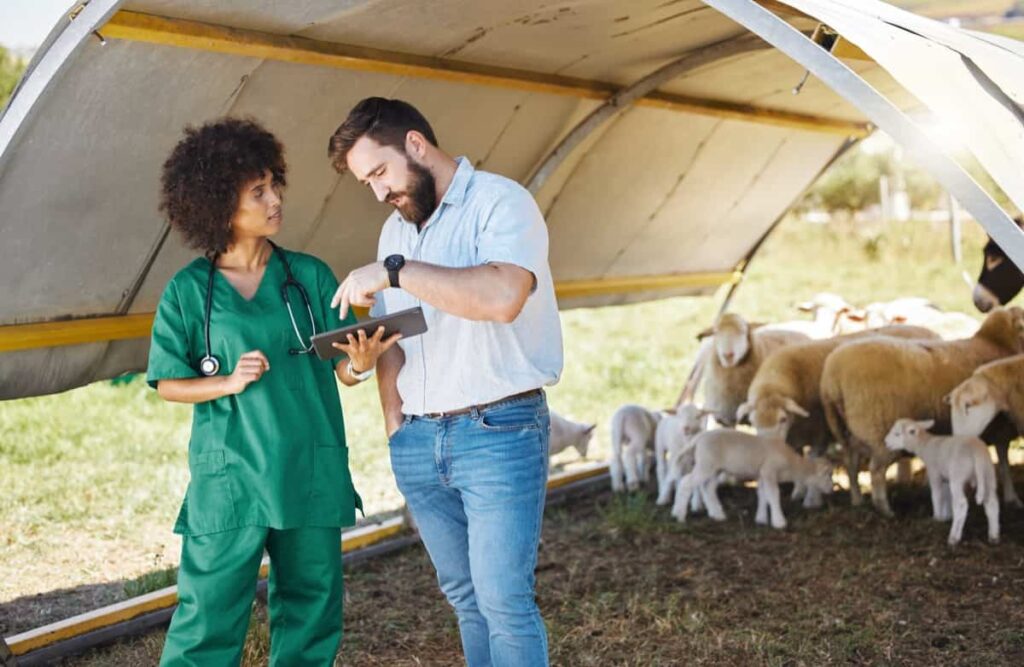
Sheep Vaccination Schedule for Common Diseases
- This may include vaccines for enterotoxemia, pneumonia, clostridial, respiratory, and other infectious diseases.
- The schedule should consider the appropriate timing and intervals for primary vaccination and booster shots.
Conclusion
Following a proper vaccination schedule and deworming chart/calendar is crucial for maintaining the health and well-being of sheep. Adhering to best practices, administering vaccines and dewormers correctly, and seeking veterinary guidance is essential for successful sheep management.
- Sheep Farming Business Plan for Beginners
- Aquaponic Farming at Home: A Step-By-Step Guide
- Profitable Village Farming Business Ideas in 2024
- High-Yield Aquaculture: Fast-Growing Fish for Farming
- Effective Fish Pond Construction Techniques for Beginners
- Irrigation and Water Management in Pineapple Farming
- Blossom to Harvest: Mastering Flowering and Pollination in Papaya Farming
- Pig Fattening Essentials: From Selection to Sale for Beginners
- Raising Wagyu Cattle: A Complete Guide for Premium Beef Production
- Soil Types and Their Water Holding Capacity
- Optimizing Irrigation Schedules for Coconut Groves for Enhanced Yield
- Espresso Your Garden: Coffee Grounds for Healthier Acid-Loving Plants
- The Best Soil Mix for Snake Plants: How to Mix Your Own Snake Plant Soil
- Green Thumb Success: Expert Tips for Cultivating Greenhouse Beans All Year Round
- Bloom All Year Round: The Ultimate Guide to Indoor Hyacinth Care
- Eco-Friendly Gardening: How to Make Liquid Fertilizer from Kitchen Waste
- Ultimate Guide to Grow Anise in Pots: Explore Seed Propagation to Harvesting
- Guide to Raising Chester White Pigs: Discover Breed Facts to Growth Management
- Mastering the Elegance: The Ultimate Guide to Weeping Cherry Tree Care, Planting, and Maintenance
- Ultimate Guide to Planting Garlic in Grow Bags: Growing Strategies for Beginners
- How to Fix Spider Plant Leaf-Related Problems: Natural and Organic Remedies
- 10 Reasons Why Your Tulsi Plant is Shedding Leaves: Home Remedies and Solutions
- Optimizing Growth and Yield: The Advantages of Palm Bunch Ash Fertilizer
- Utilizing Neem Oil Extract as a Natural Pesticide for Hydrangea
- From Soil to Harvest: Various Ways in Which Farmers Can Use AI Tools
- Steps to Encourage and Induce Citrus Flowers: A Comprehensive Guide
- How to Fix Snake Plant Leaf-Related Issues: Natural and Organic Remedies
- Transform Your Garden into a Fragrant Oasis with Raat Ki Rani (Night Blooming Jasmine)
- Discover the Ideal Chicken Breeds for Philippine Farms
- How to Create a Poultry Egg Farm Business Plan for Profits
- Grow Lemon Cucumbers Like a Pro: Insider Techniques for Bountiful Yields
- Ultimate Guide to Caring for Your Pink Princess Philodendron: Tips for Thriving Variegation
- Areca Nut Profit Per Acre: Calculating Yield and Cost of Cultivation
- How Kaveri Chicken is Becoming a More Profitable Breed in Indian Backyards
- Transform Your Barn: 9 Steps to Convert a Horse Stall into a Chicken Coop
- Exploring Suffolk Sheep Disadvantages with Limitations and Challenges
